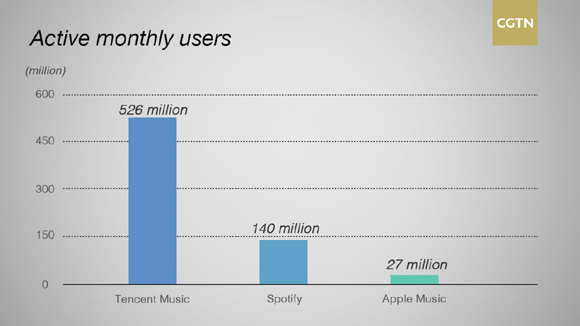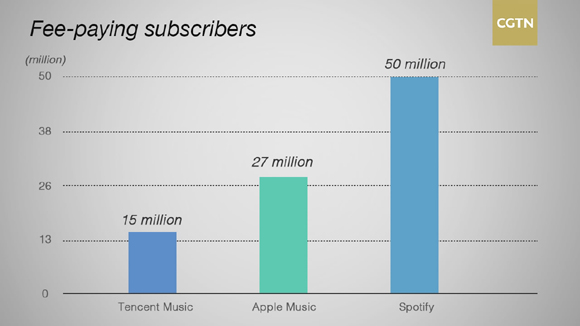
Tencent and Alibaba mull sharing music licensing. (Photo/CGTN)
An agreement between rivals Tencent and Alibaba on sharing music licensing is being heralded as a major step forward for streaming in China, as record labels look to develop a market with huge potential.
The deal sees Tencent Music Entertainment Group sub-license its rights with major labels like Universal, Sony and Warner to Alibaba's Ali Music, in exchange for access to some of Asia's biggest labels like Rock Records, HIM International and Media Asia Entertainment Group.
This means Chinese music fans using services like Ali Music's Xiami or Tencent's QQ Music can access more artists without having to subscribe to multiple platforms.
The deal is expected to encourage more users to pay for subscriptions, with the music industry hoping Alibaba and Tencent's collaboration can unlock the huge potential of streaming in China.
The deal comes amid speculation that QQ Music – believed to have as much as a 77 percent share of China's streaming market – is gearing up for an IPO that Bloomberg reports could be worth as much as 10 billion U.S. dollars. But is China's streaming market big enough to compete with well-established names like Spotify, Apple Music and Tidal?
How many people in China stream music?
Questmobile and Jefferies report that as of June this year, the three platforms operated by Tencent – QQ Music, Kugou and Kuwo – had 526 million active monthly users. That's much higher than Spotify, which reached 140 million active monthly users worldwide in June, and Apple Music's 27 million subscribers.

So streaming in China must be worth billions?
Tencent's streaming platforms may have more than half a billion active users, but only 15 million of those are believed to be fee-paying subscribers, compared to 50 million for Spotify and all 27 million of Apple Music's users.
Despite having 50 million users paying approximately 120 U.S. dollars a year, Spotify is still making big losses. 85 percent of Spotify's expenses go towards distribution and royalties, with the company reporting losses of 581 million U.S. dollars so far this year.

Apple Music charges similar subscription fees, and spends around 58 percent of its estimated 3.25 billion U.S. dollar revenue on royalties.
QQ Music's annual spend on royalties is unknown, but its subscription packages are significantly cheaper than Spotify or Apple Music, with the current annual fee for the "Green Diamond" VIP package only 120 yuan (18.40 U.S. dollars) per year.
Even if all 15 million subscribers pay that amount, revenues of 276 million U.S. dollars barely compare to the 3.064 billion U.S. dollars raked in by loss-making Spotify in 2016.


















































